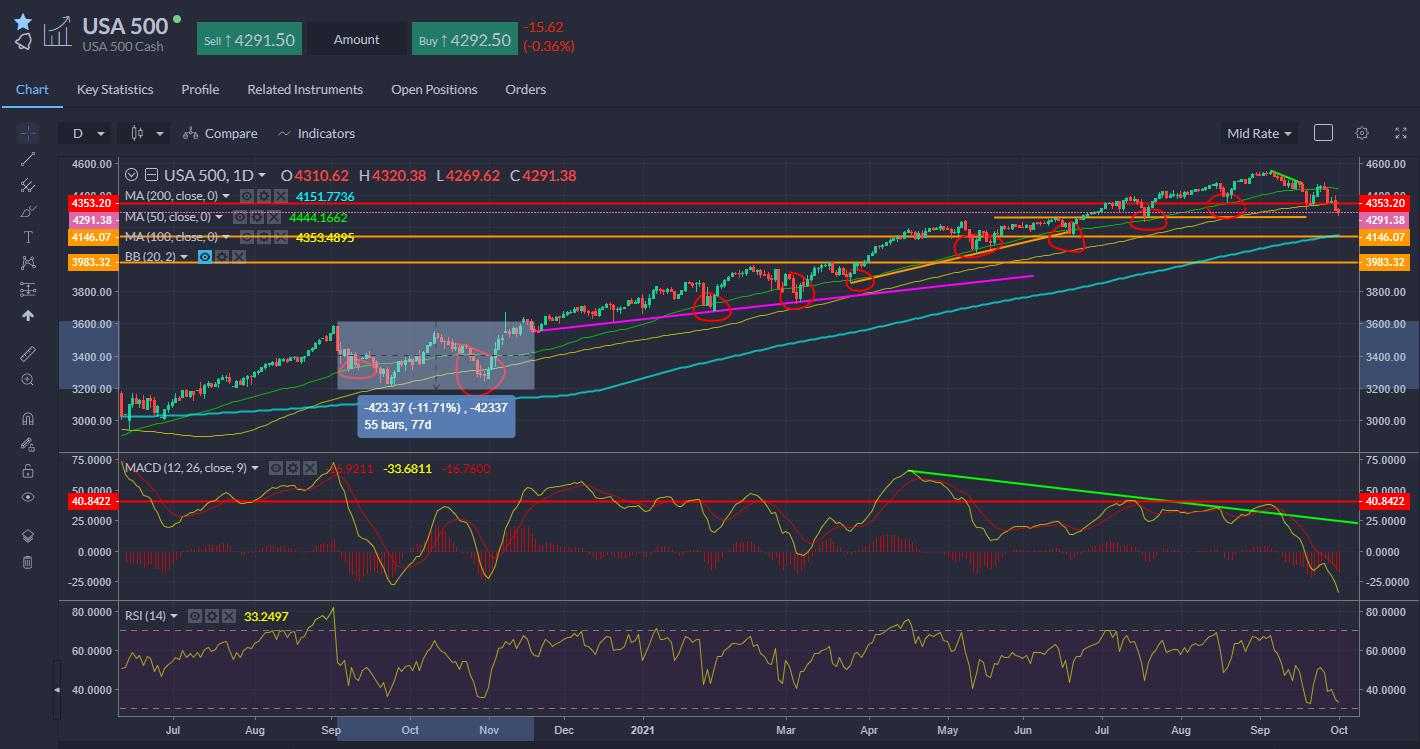Stock markets in Europe fell sharply in the first day of trading in the new quarter, taking the cue from a dismal finish on Wall Street. It’s a sea of red for European bourses though hefty early losses were pared after the first hour of trade. The FTSE 100 briefly dipped back under 7,000 – remains fully range bound. Banks and cyclicals bore the brunt, whilst utilities is the only sector in the green as defensives find some bid. The S&P 500 dropped steeply into the close, shedding about 40pts in the last 20 minutes of the session and ensuring the broad market’s worst month since March 2020 – remember it? It’s now through the 100-day SMA and well south of its 50-day line, about 6% off the all-time high – another 4% takes you to the 200-day support and almost a 10% correction. Stocks in Asia were broadly weaker, with the Nikkei off by 2.3% and the ASX 200 down by about 2%. China and Hong Kong were closed for holidays.
I’ve been warning for a long time about stagflation – now this is at the heart of the market’s selloff. We can pin it on worries about persistent inflation, supply chain trouble making things more expensive, labour shortages in key areas because no one wants to work, central banks tightening to avert inflation becoming unanchored and slowing growth. It’s recalibration for a macro outlook that seems to be less optimistic than it was in the first half of the year. Yields were actually down, with the United States 10-Year back below 1.5%, though these have just picked up in the early European session again. Tech stocks were outperformers so the Nasdaq fell less than peers. It’s all rather messy, volatile and indicative of a kind of negative rotation taking place. Gold rallied as yields pulled back and the dollar treaded water for a second day after Wednesday’s big rally. Oil steadied as markets look ahead to Monday’s OPEC+ decision on production increases. No reason for the cartel to open the taps any more than they have already indicated they will through to Dec.
S&P 500 – looking like a rerun of 2020 for Sep/Oct?

Bed Bath & Beyond (NASDAQ:BBBY) joined the likes of Boohoo (LON:BOOH), Nike (NYSE:NKE), FedEx (NYSE:FDX) and Kingfisher (LON:KGF) in warning on supply chains, rising costs etc – this is how it’s going to go in Q4 and we can expect more downgrades, decelerating earnings growth and lower margins – not a great setup for equity markets into a volatile month.
Ao World (LON:AO) is the latest as it warned of “challenging market dynamics in both the UK and Germany” which resulted in lower volumes than expected and affected operational leverage. Management said UK growth was hit by the nationwide shortage of delivery drivers and ongoing disruption in the global supply chain. The company also noted “industrywide issues relating to ongoing supply chain disruption”. Shares took right at the update, plunging 17% with the growth rates in Germany of 3% in particular well below market expectations for +30% for the full year. AO World needs high double-digit revenue growth to justify its valuation. Margins in a highly commoditized business were always a problem and now the supply chain woes coupled with a shortage of drivers creates some serious headwinds for the stock, which benefitted greatly from the surge in online demand last year. It now faces some new challenges which seem set to perform the double trick of hammering margins and lowering revenue growth.
J D Wetherspoon (LON:JDW) shares fell 4% at the open before recovering as it warned of the chilling effect of lockdowns and problems in finding staff. The pub group said like-for-like sales in the first nine weeks of the current financial year were 8.7% lower than the same weeks in August and September 2019, before the pandemic started.
Today we look ahead to US inflation and the PCE personal income and expenditure report which is expected to hold steady at 4.2%. Core month-on-month is forecast to slow to +0.2% from +0.3% registered in July. Year-on-year core inflation has been steady at 3.5/6% for three months, but the headline PCE number has been on the march higher from 2.5% in March to 4.2% in July. It’s unclear whether this can change the narrative, which seems to have evolved from inflation being transitory to it being far more persistent. Input cost pressures and the supply chain problems don’t suggest we will see consumer inflation ease.
Finally it seems Tesla (NASDAQ:TSLA) bulls are getting out. Cathie Wood of Ark has dumped about 20% of its holding. Chamath Palihapitiya said he’s sold his Tesla stake, despite once being one of its biggest cheerleaders. Now he likes offline highly cash generative businesses. So I assume by that he means miners and oilers...Meanwhile ARK investors are also getting out – third biggest daily outflow ever on Wednesday...
